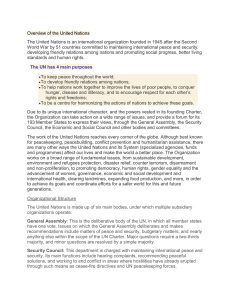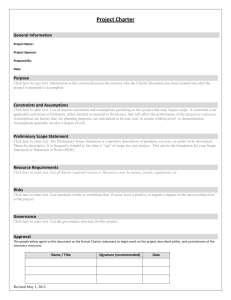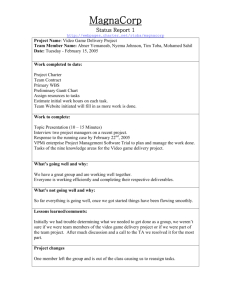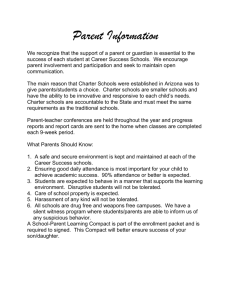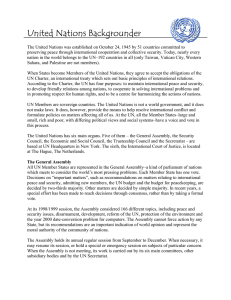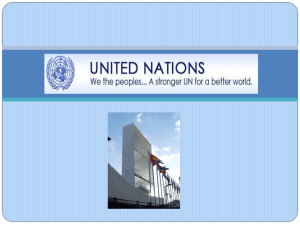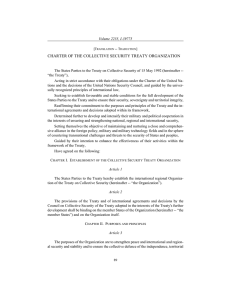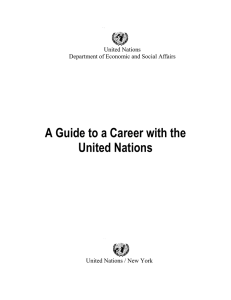The United Nations
advertisement
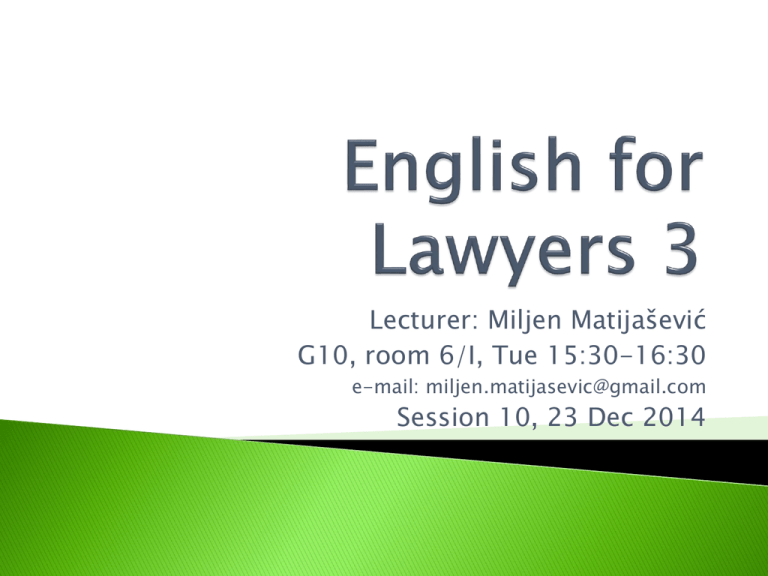
Lecturer: Miljen Matijašević G10, room 6/I, Tue 15:30-16:30 e-mail: miljen.matijasevic@gmail.com Session 10, 23 Dec 2014 1. Revision of the last session 2. The United Nations The Legal Character of International Law 1. 2. 3. 4. 5. 6. What are some of the areas that public international law regulates? What are the primary sources of PIL? What is the difference between a treaty and a convention? What does it mean to: adopt, sign, ratify, and accede to a treaty? What do you know about the principles concerning the conclusion of treaties from the Vienna Convention? What do you know about the composition and jurisdiction of the International Court of Justice? Unit 26 international organisation facilitating cooperation in international law, prevention of war, promoting human rights, economic and social development, social progress and world peace founded on 24 October 1945 with the ratification of the Charter of the United Nations, signed at the UN Conference in Internation Organization in San Francisco (June 1945) The League of Nations founded immediately after WW1 headquarters: Geneva, Switzerland main aim – to prevent another world war in addition: promoted social and economic progress, global health, suppression of drug and human trafficking The League of Nations had no military forces, used arbitration and negotiation instead at its peak had 58 member countries (the USA never a member) disintegrated as WW2 started 193 member states (nearly all sovereign nations of the world) headquarters: New York City, NY, USA offices also in Geneva, Vienna, Nairobi to keep peace throughout the world to develop friendly relations between nations to work together to help people live better lives, to eliminate poverty, disease and illiteracy in the world, to stop environmental destruction and to encourage respect for each other's rights and freedoms to be a centre for helping nations achieve these aims 2000 United Nations Publications all Member States have sovereign equality all Member States must obey the Charter countries must try to settle their differences by peaceful means countries must avoid using force or threatening to use force the UN may not interfere in the domestic affairs of any country countries should try to assist the United Nations 2000 United Nations Publications six official languages: ◦ English ◦ French ◦ Arabic ◦ Chinese ◦ Russian ◦ Spanish consists of six principal organs: General Assembly Security Council Economic and Social Council Secretariat International Court of Justice (in The Hague) Trusteeship Council (inactive) also: specialised institutions specialised agencies: World Health Organisation (WHO) Food and Agriculture Organisation (FAO) World Bank United Nations Educational, Scientific and Cultural Organization (UNESCO) International Monetary Fund (IMF) UN’s Children Fund (UNICEF) etc. General Assembly General Assembly main deliberative, policymaking and representative body of the UN a forum of multilateral discussion under the Charter meets in yearly sessions (Sep-Dec) one state – one vote resolutions of the UN not binding on the members, except budgetary matters Security Council Security Council body in charge of maintaining world peace and security five permanent members: China, France, Russia, the UK and the USA (veto power) ten non-permanent members (voted for twoyear terms) power to issue binding decisions that Member States have agreed to abide by in the Charter Economic and Social Council (ECOSOC) promotes intrenational economic and social co-operation and development has 54 members voted by the General Council for a three-year term meets once a year co-ordinates special bodies meets with representatives of IMF and WB Secretariat carries out day-to-day work of the organisation provides services for UN bodies ◦ carries out studies, gathers information ◦ implements programmes and policies (e.g. peacekeeping operations) ◦ helps resolve international disputes ◦ organises conferences ◦ translates documents ◦ acts as a PR for the UN Secretariat headed by Secretary-General currently: Ban Ki-moon (took over from Kofi Annan in 2007) chief officer of the UN can draw the attention of the Security Council to “any matter which in his opinion may threaten the maintenance of international peace and security”, under the UN Charter not a homogenous body usually slow decision-making process, particularly in the area of peacekeeping and international relations long time to achieve consensus both global and national interests considered treaties often abided by owing to pressure from the media and the public Thank you for your attention!
